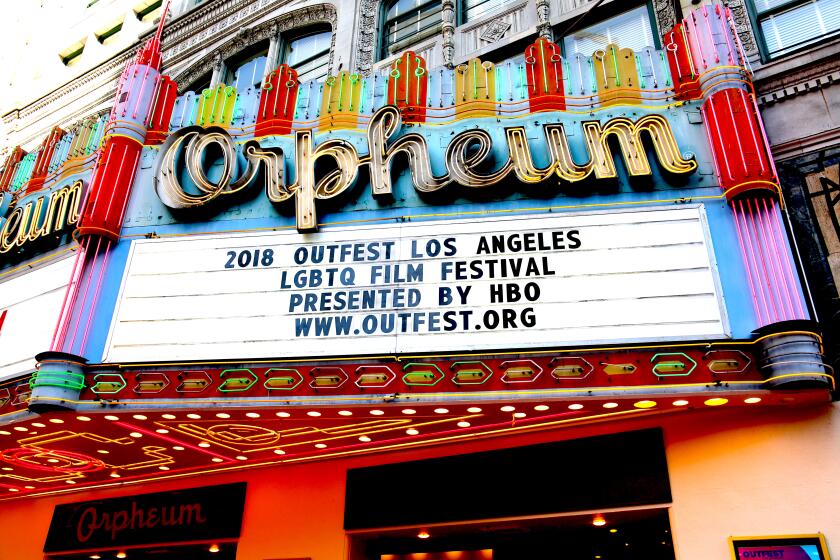Toronto Film Festival: ‘Waves’ and ‘Just Mercy’ shine a light on black American families in crisis
- Share via
TORONTO — One of the pleasures of attending a cinephile buffet like the Toronto International Film Festival is the chance to experience a movie fresh, before your expectations have been shaped by advance raves and pans, summaries and spoilers. At the same time, because a festival naturally functions as an incubator of buzz, where early reactions are amplified and sometimes distorted, it can take a real effort to avoid those reactions — to keep your head down, your ears closed and your mind as open as possible until you’ve seen a movie for yourself.
And so I’m pleased not only to have seen “Waves,” the emotionally shattering and thrillingly unpredictable new movie written and directed by Trey Edward Shults, but also to have taken the advice of friends and colleagues who’d warned me to go in as cold as possible. The only way for you to ensure a similarly untainted experience would be to stop reading now and see the movie when A24 releases it Nov. 1 in theaters, which you should do in any case. For those who choose to read on, I will try to be as oblique as possible.
The opening moments of “Waves” have an infectious pop beat and an enveloping, sun-drenched exuberance. We jump into a car with Tyler (Kelvin Harrison Jr.), an outgoing kid and high-school wrestling star, and his girlfriend, Alexis (Alexa Demie), as they drive around the South Florida suburb they call home. Their lust for life is infectious; we could be watching a kinetic essay on the beauty of the body in motion. The camera rarely sits still — sometimes swiveling on its axis, sometimes stalking the characters from behind — and its movements drive the picture’s own tonal oscillations between ecstasy and dread.
We soon meet the rest of Tyler’s family, whom he gets along with well enough, though he doesn’t have much time for his stepmother, Catherine (Renée Elise Goldsberry), or his younger sister, Emily (Taylor Russell). His father, Ronald (Sterling K. Brown), is attentive but gruff, nagging his son to work hard and show respect. Their dynamic is compulsively physical; the two bond over arm wrestling and weight lifting, though only we in the audience are really privy to what’s going on in Tyler’s head. What we see is a gifted, promising, often frustrated youth who works hard, plays hard and spends a lot of time on social media, and who faces the challenges of being a black man in America (a white woman calls him a racist epithet in one particularly heated moment) but who also enjoys the privileges of masculinity and middle-class comfort.
One of the subtler points in “Waves” is that manhood often hogs the spotlight — in families, in relationships, in sports, in movies. And so it’s both pointed and moving when the story suddenly ruptures and shifts toward Emily, whose presence has made itself felt here and there in the margins, but whose consciousness now fully merges with the camera’s own. Emily is sensitive and smart, with troubles and fears of her own; she also has a new boyfriend (a lovely Lucas Hedges), who helps remind her that tragedy in life is often a beginning as well as an end. And Russell, making a remarkable big-screen debut, acts with a soulful gravity that is the perfect emotional counterweight to Harrison’s brooding and uncontainable fury.
The title of “Waves” could refer to the tides we often hear pounding the surf in the background, or it could describe the very structure of the movie, which continually builds and releases tension, gathering up moods and anxieties and flinging them at you with steady, rhythmic force. Shults, a scarily talented 30-year-old, is one of only a few American independent filmmakers who treat the camera not as a passive observer of the drama but as an active participant. He knows that stories are more than the sum of their plot points; they’re about mood and psychology, texture and atmosphere.
Shults probably gleaned a few of those lessons years ago working with Terrence Malick, although crucially, he’s the rare acolyte with more to offer than a slavish imitation of the Malick style. His previous features are the Cassavetes-esque character study “Krisha” and the post-apocalyptic thriller “It Comes at Night” (which also starred Harrison), both intense family dramas marked by an implacable dread. “Waves” is an even deeper plunge into the same pool, but for all its darkness, it’s also a work of great tenderness, with a bracing openness to complex new frontiers of human experience.
It was instructive to go from a press-and-industry screening for “Waves” to the gala premiere of “Just Mercy,” Destin Daniel Cretton’s exceedingly polished new movie about a very different African American family in dramatic free fall. Adapted from a 2014 book by the attorney and activist Bryan Stevenson, it tells the story of Walter McMillian (Jamie Foxx, doing his best work in some time), an Alabama man who, in 1988, was convicted of a crime he didn’t commit and spent almost six years on death row. His conviction was ultimately overturned in 1993, thanks to the crusading efforts of Stevenson (played here by Michael B. Jordan), who exposed the myriad missteps in the case, from suppressed evidence to outright perjury.
Stevenson has spent his career pushing for justice and reform, speaking out against capital punishment and also against the racism, both individual and systemic, that has sent countless innocent men to their state-sanctioned deaths. “Just Mercy” is a handsome, impeccably mounted tribute to his activism and also his fellow advocates, especially Eva Ansley (Brie Larson), with whom he now spearheads the Equal Justice Initiative. Apart from the momentary cognitive dissonance of seeing Erik Killmonger join forces with Captain Marvel, the movie is almost exactly what you’d expect: It has stirring speeches, infuriating setbacks and a tendency to overstate the obvious. A shot of a bigoted judge in a bar with a Confederate flag visible in the background may be an accurate bit of local detail, but it’s also the kind of nudge this ambiguity-free movie doesn’t need.
The Warner Bros. release is set to open in a limited awards qualifying run in late December before a wider roll out in January, “Just Mercy” feels engineered to get a festival audience to weep on cue. I hope those who were still sniffling on their way out of the theater will also make time for “Clemency,” Chinonye Chukwu’s austere and galvanizing drama starring a superb Alfre Woodard as a death-row warden. (It will be released Dec. 27 by Neon.) That movie, which won the grand jury prize for American narratives at Sundance and is also receiving a gala premiere here in Toronto, advances its own powerful case against the death penalty, one that manifests little faith in the system but shows a profound belief in the audience’s intelligence.
The same can and should be said for the outstanding Romanian documentary “Collective,” a gripping, despairing exposé of institutional injustice that is playing here in Toronto after shaking up audiences earlier this week at the Venice International Film Festival. Directed by Alexander Nanau, this nimble observational work begins as an account of a fire that broke out in 2015 at the Bucharest nightclub Colectiv, killing 64 people. But while 27 of those people perished in the blaze, 37 of them died in hospital in the weeks that followed, thanks to a medical establishment that proved singularly ill-equipped to treat burn victims, many of whom died from preventable infections as a result.
The full scale and implications of this tragedy, investigated at length by the journalist Catalin Tolontan and explored with dogged fury here by Nanau, add up to a staggering indictment of a society in which people don’t just cut corners but are actively incentivized to do the wrong thing. That society may be Romania, which has produced no shortage of great filmmakers, working in both fiction and nonfiction, who have surveyed their nation’s corruption with grim fatalism and absurdist humor. But the concerns of “Collective” are effectively borderless. They resonate in any city or nation where the weakest and neediest suffer while the rich get richer, and where not even the most horrific scandal can send an apathetic populace to the polls.
More to Read
Only good movies
Get the Indie Focus newsletter, Mark Olsen's weekly guide to the world of cinema.
You may occasionally receive promotional content from the Los Angeles Times.












